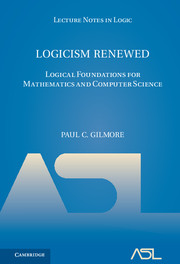Chapter 7 - Logic and Mathematics
Published online by Cambridge University Press: 30 March 2017
Summary
Introduction
It is unlikely that anything new can be added to the discussion of the relationship between logic and mathematics one hundred and twenty years after the publication of Frege's [49] and seventy years after that ofGödel's [69]. But since the logic ITT differs in several important respects from previously considered logics it is perhaps worthwhile restating some old positions in the light of the new logic.
As expressed by Steen in the introduction to [137],
Mathematics is the art of making vague intuitive ideas precise and then studying the result.
The tool available for practicing the art is logic; thus mathematics is applied logic, a view consistent with Russell's logicism as expressed in the introduction. The subject matter of mathematics is defined predicates, and the goal of mathematics is the discovery of properties, including membership, of these predicates. This echoes the view expressed by Ayer in the quote displayed in the introduction. Evidence has already been supplied in Chapter 4 for this view of mathematics. Further evidence is supplied in this chapter. But first some implications of Gödel's theorems are discussed in §7.2.
MacLane describes in [95] an argument used in category theory that he claims cannot be formalized in any standard set theory or logic. That it cannot be formalized in either of the standard set theories is immediate. That it cannot be formalized in a logic is a direct challenge to the view that mathematics is applied logic. MacLane's claim is refuted in §7.3 for the logic ITTε using a simpler formof the argument for Abelian semi-groups suggested by Feferman in [44]. The formalization of Feferman's simplified argument makes essential use of both polytyping and secondary typing; it has been adapted from the formalization described in [65] for the inconsistent logic NaDSet.
The argument for category theory in ITTε is more complicated but essentially not different in principle from the one for Abelian semi-groups. It too depends on secondary typing, suggesting that the nominalism that motivates ITT motivates category theory as well.
- Type
- Chapter
- Information
- Logicism RenewedLogical Foundations for Mathematics and Computer Science, pp. 171 - 184Publisher: Cambridge University PressPrint publication year: 2005



